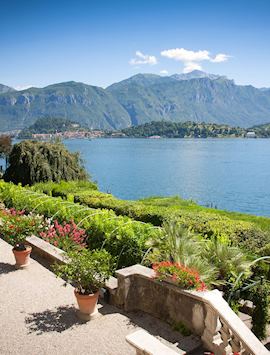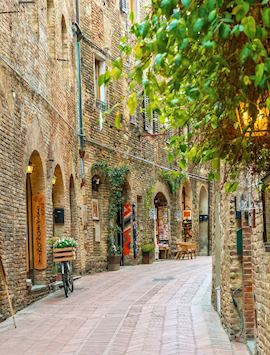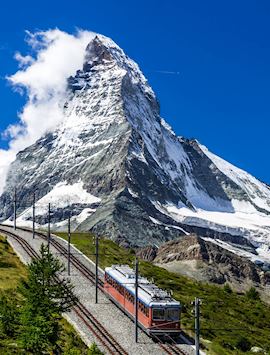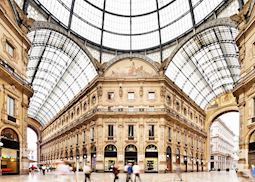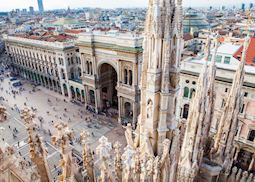Jump to:
Milan is Italy’s high-powered financial, industrial and fashion capital, home to the country’s stock exchange and most famous fashion houses, as well as two international football teams. Scratch below the surface though, and you'll find a city of high culture where Leonardo da Vinci spent much of his life and where the critics at the La Scala opera house are as renowned as its musical dramas. Much of the city has been recently regenerated with public spaces restored to their former glory. The banks of the canal have been reclaimed by new cafés and restaurants, ensuring the city's cosmopolitan atmosphere is matched by the buzz of a wholehearted embrace of the 21st century.
Italy specialist CarolineI pictured Milan as an industrial, fashion-conscious city — and it is. But with the Duomo, La Scala, and many galleries, it also feels like a cultural and artistic hub. Plus, it’s very easy to navigate.
Things to see and do in Milan
The Last Supper
One of the most famous artworks in the world, Da Vinci's Last Supper can be seen on the wall of the refectory of the unassuming Convent of Santa Maria delle Grazie. This incredible work of art, famed for its impressive use of light and perspective, was commissioned by Da Vinci's patron Ludovico Sforza and miraculously survived the near destruction of the building during Allied bombing in World War II. Extensively restored over a period of 21 years and only returned to public view in 1999, it is now, understandably, one of the most visited sites in Milan.
Duomo and terraces
Milan's magnificent Gothic Duomo (cathedral) is the city's most famous landmark, a fairytale confection of spires, statues and intricately detailed carvings. Construction began in 1386, but it was 600 years before the extravagant project came to completion. Over this time the design changed greatly and the building displays a medley of architectural styles. Inside, the decoration is equally sumptuous, but it's access to the roof terraces that make a visit unique. Accessible by lift and stairs and easily explored on foot, the terraces offer panoramic views over the city and bring you up close to many of the 3,400 sculptures positioned among the cathedral's spires.
Galleria Vittorio Emanuele II
Right next to the Duomo, this neoclassical shopping arcade is an important celebration of the country’s unification and is named after the first king of the Kingdom of Italy. Inside, the elaborate mosaic work depicts the continents as well as the coats of arms of Turin, Florence and Rome, capitals of the newly-formed kingdom. The gallery is filled with high-end designer stores and has become a popular place to congregate and people watch from its numerous cafés. A high level walkway offers a great overview of the cruciform arcade and the city around it.
La Scala Opera House
Following the destruction of Milan’s grand Teatro Regio Ducale in 1776 the city's wealthy banded together to fund the construction of a replacement ballet and opera venue by pre-purchasing their own private boxes. Built on the site of the former church of Santa Maria alla Scala, the new Teatro alla Scala, more widely known today as La Scala, opened its doors in 1778. Still one of the world’s most famous opera houses, La Scala boasts some 2800 seats that overlook one of Europe's largest stages. Over the years the opera house became renowned for hosting many of the world’s greatest artists and boasted Arturo Toscanini as its principal conductor for many years. The opera house also held a close relationship with Giuseppe Verdi, who spent much of his later life in Milan. For those wishing to pay homage to this grand building, there is a small museum dedicated to the costumes, paintings and artifacts of past performances and it also offers a glimpse of the lavish interior, if rehearsals are not in progress.
Sforzesco Castle
Built by Francesco Sforza, Duke of Milan, in the 15th century, the red-brick Sforzesco Castle was once one of the largest fortresses in Europe. The Duke employed the finest craftsmen of his day to design and decorate his masterpiece and a stroll through its imposing walls gives an idea of his enormous wealth and power. The castle is now home to seven of Milan's most prestigious museums, including a picture gallery displaying works by Canaletto, Titian and Tintoretto, the Museum of Ancient Art, which is housed in the Duke's private apartments and were frescoed by da Vinci, and most famously, the Museum of the Rondanini Pietà, Michelangelo’s final, unfinished work.
San Siro stadium
In a country where the sport is revered, San Siro Stadium is one of the great temples of football (soccer). Built in the 1920s and home to both AC and Inter Milan — who play on alternate weekends from October to May — the stadium can hold 85,000 spectators and is an incredible place to watch an international game. The stadium was the venue for the 2016 Champions League final and also plays host to various pop concerts during the summer months. It's also possible to go behind the scenes and tour the museum, locker rooms, pitch-side and tunnel.
Shopping
Milan is Italy’s fashion capital and attracts shoppers from around the world. The so-called Quadrilatero d'Oro (golden rectangle) fashion district is home to a huge number of designer stores including the flagship Armani megastore. At the same time, new, boutique fashion districts such as Brera are making their mark and are particularly trendy places to explore, with wonderful boutiques and charming restaurants. We can arrange a personal shopper to take you to the best boutiques and fashion houses, offering a local insight into the history of each brand and the quality of their products as well as introducing you to work by emerging young designers.
Canals of the Navigli District
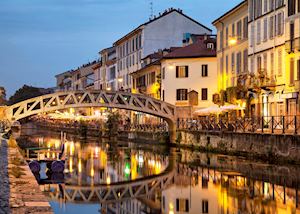 This network of canals dating back to the 12th century was originally a rather deprived area of Milan, but following the trend of other major European cities, it has now been gentrified. The workshops and wooden-beamed houses and have been reinvigorated and transformed into restaurants, boutiques and galleries; decaying, moored barges have become floating bars. In June, the canals burst into life with a festival to celebrate the arrival of summer, and strings of lights are erected over each waterway.
This network of canals dating back to the 12th century was originally a rather deprived area of Milan, but following the trend of other major European cities, it has now been gentrified. The workshops and wooden-beamed houses and have been reinvigorated and transformed into restaurants, boutiques and galleries; decaying, moored barges have become floating bars. In June, the canals burst into life with a festival to celebrate the arrival of summer, and strings of lights are erected over each waterway.
Today, in a city that can feel more industrial and urban than others in Italy, the canals provide a welcome open space. They were built in the 11th century to make Milan accessible from the sea and used to transport marble for the building of the Duomo. In the 15th century, Leonardo da Vinci added his Midas touch, designing a dam system, before trains and trams supplanted the barges in the latter half of the 19th century.
Milan’s flea markets
Depending on the timing of your visit, you may be able to visit one of the city’s flea markets. Over 400 stallholders cram onto the banks of the Naviglio Grande Canal on the last Sunday of the month, and the area becomes a joyfully hectic mass of knick-knacks such as second-hand clothes, toys and books.
On Sundays on Piazza Cordusio, you’ll find collectables including coins and stamps, whereas Piazza Mercato Abbiategrasso (second Sunday of every month) attracts serious collectors hunting for objets d’art and second-hand furniture. To increase your chances of paying a good price, try to arrive early (around 8am).
Pinacoteca di Brera
Milan’s flagship art collection, originally an art school, is found in a former 16th-century Jesuit palazzo (palace). It’s flanked by a scented herb and vegetable garden as well as ginkgo biloba trees, and feels nicely navigable. It’s nothing like the size of other grand European galleries, but nonetheless has some meaty pieces, such as Caravaggio’s Supper at Emmaus. There are also huge wall paintings by Veronese, Titian and Tintoretto.
In recent years, the gallery’s curator has been on a drive to render the collections more accessible to the public. One innovation is that visitors can now watch art restorers at work through two glass-walled rooms.
who's been there
- 617-223-4395
- Make an inquiry
Suggested itineraries featuring Milan
Our itineraries will give you suggestions for what is possible when you travel in Milan, and they showcase routes we know work particularly well. Treat them as inspiration, because your trip will be created uniquely by one of our specialists.
Places near Milan
- Como 39 kilometers away
- Blevio 42 kilometers away
- Torno 44 kilometers away
- Laglio 47 kilometers away
- Lezzeno 54 kilometers away
- Bellagio 59 kilometers away
- Tremezzo 59 kilometers away
- Lake Como 65 kilometers away
- Stresa 70 kilometers away
- Lake Maggiore 72 kilometers away
- Verbania 72 kilometers away
- Gardone Riviera 109 kilometers away
- Sirmione 111 kilometers away
- Lake Garda 114 kilometers away
- Parma 116 kilometers away
- Genoa 120 kilometers away
- Barbaresco 121 kilometers away
- Alba 125 kilometers away
- Piedmont 125 kilometers away
- Turin 126 kilometers away
- Portofino and Santa Margherita 130 kilometers away
- Barolo 138 kilometers away
- Verona 141 kilometers away
- Madonna di Campiglio 153 kilometers away
- Cinque Terre 157 kilometers away
- Modena 164 kilometers away
- Porto Venere 166 kilometers away
- Forte dei Marmi 185 kilometers away
- Bologna 201 kilometers away
- Pisa 217 kilometers away
- Dolomites 230 kilometers away
- Alta Badia 244 kilometers away
- Venice 246 kilometers away
- Florence 250 kilometers away
- Ravenna 265 kilometers away
- San Gimignano 267 kilometers away
- Siena 294 kilometers away
- Perugia 366 kilometers away
- Assisi 382 kilometers away
- Umbria 385 kilometers away
- Orvieto 385 kilometers away
- Rome 478 kilometers away
Photos of Milan
Accommodation choices for Milan
We've selected a range of accommodation options for when you visit Milan. Our choices usually come recommended for their character, facilities and service or location. Our specialists always aim to suggest properties that match your preferences.
-
![Sheraton Diana Majestic, Milan]()
Sheraton Diana Majestic
Milan -
![Armani Hotel, Milan]()
Armani Hotel Milano
Milan -
![Bulgari Hotel Milano, Milan]()
Bulgari Hotel Milan
Milan -
![Hotel De La Ville, Milan]()
Hotel De La Ville
Milan
Ideas for experiencing Milan
Our specialists seek out authentic ways to get to know the places that could feature in your trip. These activities reflect some of the experiences they've most enjoyed while visiting Milan, and which use the best local guides.
-
Personal shopper experience in Milan ![Galleria Vittorio Emanuele II, Milan]()
Personal shopper experience in Milan
Personal shopper experience in Milan
Renowned as one of the most stylish cities in the world, your personal shopper will ensure you have the best experience possible browsing Milan's boutiques, tailored around your preferences.
View details -
Explore the highlights of Milan ![Duomo Square, Milan]()
Explore the highlights of Milan
Explore the highlights of Milan
Explore the highlights of Milan, including Leonardo da Vinci’s ‘Last Supper’, on a walking city tour around the city with your private guide.
View details


